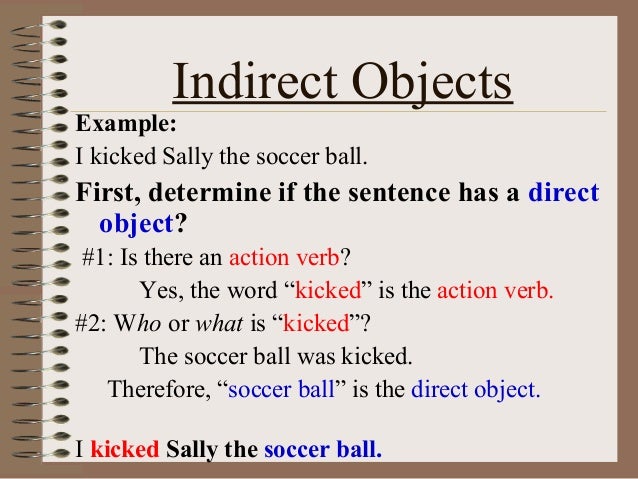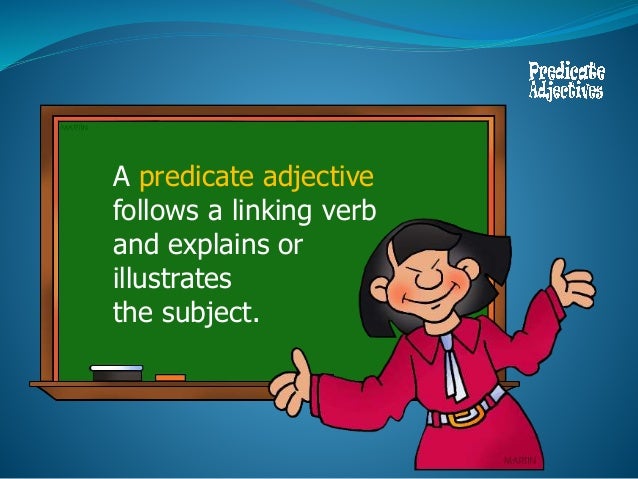There are four subject complements:
Direct Object
Indirect Object
Predicate Nominative
Predicate Adjective
Direct Object
A DIRECT OBJECT is a noun or a pronoun that follows an ACTION VERB in a sentence. It is never in a prepositional phrase. You find it by asking WHAT or WHO after the ACTION VERB.
- Direct Object is a noun or a pronoun
- Direct Objects (if they exist in a sentence) will follow an action verb.
- Direct Objects are never in prepositional phrases
- Find a Direct Object by asking WHAT or WHO after the action verb.
How to find a DIRECT OBJECT:
- Read the sentence
- Identify the subject
- Identify the verb (make sure it is action)
- Ask WHAT or WHO after the action verb
- If you get an answer that’s a NOUN/PRONOUN, you probably found the DIRECT OBJECT.
EXAMPLES:
- The teacher made a huge semester test for us to take.
- Subject is teacher
- Verb is made (that’s an action verb)
- Ask WHAT/WHO after made
- The answer to WHAT/WHO is test.
- TEST is the direct object
DIRECT OBJECTS can be compound. (That’s two or more.)
- My best friend brought to the party pizza and pop.
- Subject is friend
- Verb is brought
- Ask WHAT/WHO after brought
- The answer to WHAT/WHO is pizza and pop
FIND THE DIRECT OBJECT:
- Sinclair sold his old bike to me.
- The twin sisters told Helen and me about the ghost.
HOMEWORK: DO THE FOLLOWING WORK ON A SEPERATE PIECE OF PAPER.
Objects: Direct Objects
An object of a verb is a noun, pronoun, or word group that completes the meaning of a transitive
verb—a verb that expresses an action directed toward a person, a place, a thing, or an idea.
A direct object is a noun, pronoun, or word group that tells who or what receives the action of a
transitive verb or shows the result of the action.
A direct object answers the question “Whom?” or “What?” after a transitive verb.
EXAMPLES I gave the books to Harrison. [Gave what? Books.]
Don’t forget Hans and Kate. [Forget whom? Hans and Kate.]
EXERCISE A Decide whether the underlined words in the following sentences are direct objects. If the
word is a direct object, write DO above the word. If it is not a direct object, write NDO.
Example 1. Medieval knights often rescued people in danger.
1. The nobles wore steel armor and helmets.
2. He was a successful warrior thanks to his great war horse.
3. Women in splendid gowns attended the tournaments.
4. Aknight would often throw a scarf to his lady during the events.
5. People of the Middle Ages respected chivalry, bravery, and honor.
6. Medieval students studied the craft of alchemy.
7. Travelers took shelter in a castle or monastery.
8. Educated nobles enjoyed the tales of Chaucer and the poetry of Petrarch.
9. King Edward III’s son was the Black Prince.
10. King Edward III started a war with France.
EXERCISE B Underline the direct objects in the following sentences.
Example 1. Knights endured dangerous Crusades to foreign lands.
11. In 1346, trading ships carried infected black rats into Italian ports.
12. Fleas on the rats spread a dangerous disease.
13. The bubonic plague killed thousands throughout Europe until 1352.
14. It attacked people of all ages.
15. Medieval doctors found no cure for the plague.
EXERCISE "C" In the following sentences, underline the direct objects.
Example 1. You should have goals for your job. (You should have (ask what?). The answer is goals. GOALS is your D.O.
1. Did our neighbor stake her new plants?
2. Have you read those chapters yet?
3. Had the enormous whirlpool trapped the schooner?
4. Dad and Mom planted decorative native grasses along the back fence.
5. Letitia, Ira, and Colin helped the pep squad and me with the goal post decorations.
6. After you remove all liquid from this solution, determine the amount of sodium remaining.
7. Once a week, Pearl added a fictional adventure to her journal.
8. Travel agents usually can answer questions about your destination.
9. During today’s practice, Coach wants cooperation.
10. Where does Mr. Jepson keep the markers, poster board, and gluesticks for this project?
11. Everyone cheered the football team wildly because it had reached the state finals.
12. At the farmer’s market we will buy spring onions, black-eyed peas, and peaches.
13. What great coordination Odelle, Jillian, and you bring to our defense!
14. For the awards banquet next month, invite someone as your guest.
15. Six of Eliot’s great-grandchildren attended his ninetieth birthday party yesterday.
16. Graph the tallest mountains in the fifty states.
17. DeNiequa should be taking both of you with her when she buys groceries.
18. Mei-Ling watched the toolmaker as he finished the point on the shovel.
19. How much oil do sunflower seeds yield per pound?
20. What a wonderful fabric you have selected for the upholstery on the sofa and chairs!

Indirect Object

The INDIRECT OBJECT (I.O.) is a noun or a pronoun that comes after an ACTION VERB but before a DIRECT OBJECT. A sentence must contain a DIRECT OBJECT. If it does not, you can’t have an INDIRECT OBJECT. An INDIRECT OBJECT will not be in a prepositional phrase.
Find the INDIRECT OBJECT by:
- Reading the sentence first
- Identify the subject
- Identify the action verb
- Ask WHAT/WHO to find the DIRECT OBJECT
- If there is a DIRECT OBJECT ask TO WHO/FOR WHOM something has this been done.
- If you have an answer, and it is a noun/pronoun you have found the INDIRECT OBJECT. You will never find an INDIRECT OBJECT in a prepositonal phrase.
EXAMPLES:
- Nurline told her mother a big, juicy lie. (mother is the indirect object. [Nurline + told (Ask what? Answer is lie. Then ask TO WHO/FOR WHOM did she tell the lie. Answer is mother)]
- The judge gave the jury his instructions on the case. (jury is the indirect object. [Judge gave (Ask What? Answer is instruction. Then ask TO WHOM/FOR WHOM did he give the instructions? The answer is US.)].
Find the INDIRECT OBJECT in the following sentences:
- The students gave Mr. Gravas an award for being a good teacher.
- My arch rival Willie sold a car to me.
HOMEWORK: DO THE FOLLOWING HOMEWORK ON A PIECE OF PAPER.
Objects: Indirect Objects
EXERCISE A: Put DO above the direct object and IO above the indirect object. Sentences do not have to have an IO.
Example 1. Jill handed Jack the bucket.
1. Are you reading the book I gave you?
2. I mailed my brother the birthday gift.
3. Juanita sent her teacher an Easter card.
4. Would you like a drink with your sandwich?
5. Please send me a copy of the letter.
6. The flight attendant offered the passengers drinks and snacks.
7. Are you going to buy plates and napkins for the picnic?
8. The dog chased its tail for several minutes.
9. Please hand me the pitcher of orange juice, Franco.
10. Have you given Janice your answer yet?
EXERCISE B Underline the indirect objects in the following sentences.
Example 1. Fred sent the college his application.
11. Why don’t you tell us a story?
Aunt Maria brought me a souvenir from 12.
13. The driver told the officer his version of the accident.
14. Please offer cousin Tina my condolences.
15. Lester loaned Miranda a sweater.
GRAMMAR
EXERCISE C: Follow the Directions for Excercise A above.
Example 1. Please take him these sandwiches.
1. The committee chairperson gave her the gavel.
2. Our pool’s lifeguard left Manuelo the free passes.
3. The interview will give Emily a chance to visit the college.
4. The algebra teacher lent her a new ruler.
5. Aerobic dancing provided us an opportunity for vigorous exercise.
6. The track star jumped hurdles and ran relays during the meet.
7. The pet store owner gave the puppy a bone.
8. The doctor prescribed penicillin for the child’s illness.
9. The counselor offered the students some advice.
10. Their discovery of radium and polonium earned Pierre and Marie Curie the Nobel Prize
in physics.
11. Kareem taught his sister an African American folk song.
12. The president signed the energy bill after the congressional vote.
13. The Lions Club awarded Mrs. Rosa a silver tray for community service.
14. The tree branch struck the car’s windshield with a crash.
15. Toni Morrison read the audience an excerpt from her novel.

Predicate Nominative
Definition: A predicate nominative (PN) is a noun or a pronoun that comes after a linking verb. Its function is to rename the subject. You find it by asking WHAT or WHO after the linking verb. It can never, ever be in a prepositional phrase.
Here are the steps in finding a predicate nominative (PN):
- Find the noun
- Find the verb
- Ask WHAT/WHO after the verb
- If you find an answer and it is a noun/pronoun and it RENAMES the subject, you have found a predicate nominative (PN)
EXAMPLES:
1. The new car was the all new Utopia.
car (subject)
was (linking verb)
car was what/who?
The answer is UTOPIA. Utopia renames the subject car.
- His new friend was the new captain of the team.
- Henrietta ate the pie.
- With his cousins Jim was found behind the barn.
- Eloise, Myron, Sufia, Hans, and Ming Li were the winners of the academic awards.
***A predicate nominative can be compound.
EXAMPLES
- The books were a novel, a dictionary, and a reference.
HOMEWORK: DO THE FOLLOWING WORK ON YOUR OWN PAPER
The Subject Complement: Predicate Nominatives
EXERCISE A Underline each predicate nominative in the following sentences.
Example 1. Did Peter become the new captain of the team?
1. Louis is a mathematician and a teacher.
2. Were those two girls the winners?
3. After years of hard work, she became a superb ballerina.
4. Should Barney have been the leader of this team?
5. What an excellent singer she is!
6. The pianist is a composer, also.
7. Mrs. Woodward became an excellent nurse.
8. Her doves’ names are Juliette, Musetta, and Luigi.
9. What a mistake that could have been!
10. My father has been an engineer, a scientist, and a professor.
EXERCISE B Underline each predicate nominative in the following sentences.
EXERCISE In the following sentences, circle the linking verb and underline the predicate nominative.
(Hint: Some sentences contain a compound predicate nominative.)
Example 1. The leader will be Maria.
1. My partner for biology lab is Penelope.
2. Jason will be the next student council president.
3. Mrs. Furillo’s favorite song is still “Night and Day.”
4. Rocky Marciano was the world heavyweight boxing champion from 1952 to 1956.
5. My coat is the red one.
6. Leon would have been my first choice for the part.
7. Michelle Kwan has become an inspiration to us all.
8. Is Sara the runner in the blue T-shirt?
9. I could have been a contender.
10. The winner of the spelling bee was Tracy.
11. The next speaker will be Mr. Gonzalez.
12. Who was the fourteenth president of the United States?
13. My favorite memory of the trip is our day at the Grand Canyon.
14. At the age of eighteen, my father became the first person in his family to go to college.
15. Were the stars of that movie Lauren Bacall and Humphrey Bogart?
16. The winner is Terry!
17. Did Sheila become an accountant?
18. Grace’s preferences for lunch are sandwiches or soup.
19. The next contestant on the show is Mr. Hynes.
20. Ginger should have become an actress.

Predicate Adjective

A predicate adjective (PA) is an adjective that comes after a linking verb in a sentence. Its job is to describe the subject of the sentence. A sentence does not have to contain a PA. To find the PA, ask WHAT or HOW after the linking verb. REMEMBER the PA must describe the subject. To check if you have identified the PA, move the PA in front of the subject. If it describes the subject, you found it. ***Predicate Adjectives can not be in a prepositional phrase.
EXAMPLES:
Use these steps to find the PA:
- Read the sentence
- Identify the subject
- Identify the verb—make sure it is a linking verb
- Ask WHAT or HOW after the linking verb
- If you have an answer, that will probably be the PA
1. The old car was really rusty.
Car was (ask WHAT or HOW) RUSTY
Rusty is the PA. It describes the car. I can put RUST in front of car: RUSTY car
2. My neighbor’s yard was very messy. (What is the PA?)
You can have a compound predicate adjective. A compound PA is two or more PAs in the same sentence.
EXAMPLE:
Over the years my house has been white, blue, and yellow.
House has been (ask What or How) white, blue, yellow
White house blue house yellow house
Examples:
The baker is messy.
His new car was red, small, and sporty.
After the class meeting, LaToya ate a piece of cake.
The chocolate candy looks very delicious.
The creepy, greenish caterpillar was hairy and spikey.
HOMEWORK: DO THE FOLLOWING WORK ON YOUR OWN PAPER
The Subject Complement: Predicate Adjective
A subject complement is a word or word group that completes the meaning of a linking verb
and identifies or modifies the subject.
A predicate adjective is an adjective that is in the predicate and that modifies the subject of a
sentence or a clause.
EXAMPLES He is becoming stronger. I heard that the joke you told was humorous.
How ridiculous I felt! The children seem lively and mischievous.
EXERCISE A Underline each predicate adjective in the following sentences.
Example 1. Did the baby seem restless and nervous this morning?
1. Carlos has grown much taller through the years.
2. Does the soup taste too salty to you?
3. How beautiful her voice is!
4. The seas appear calm this morning.
5. The kitten looked quite content in its new box.
6. The modern music sounded odd to us.
7. Does Jorge seem happy in his new home?
8. The roses from the bush outside smell sweet.
9. François is satisfied with his new job.
10. How soft and delicate the baby bird seems!
11. How the sunset is this evening!
12. Lin often feels after soccer practice.
13. As the sky grew darker, the stars grew .
14. Jennifer seems about winning the award.
15. This ghost story is than I remembered.
EXERCISE B: Underline each predicate adjective in the following sentences.
EXERCISE In each of the following sentences, circle each linking verb and underline all predicate
adjectives.
Example 1. Was the new airplane smaller and faster than the older planes?
1. Our cat Conrad is small for his age.
2. The boiled potatoes tasted a little too bland for me.
3. Belinda sounded optimistic about the outcome of the student council election.
4. Parker looks very nice in that hat.
5. Sales of the new school calendar appear brisk.
6. The llama’s fur felt soft to Marcia’s touch.
7. The door to the basement is squeaky.
8. After his feeding, the baby remained quiet for the rest of the night.
9. The crowd at the championship game was energetic and enthusiastic.
10. Michael’s new wool coat felt rough and scratchy against his skin.
11. Lance didn’t become tired until the final lap of the race.
12. The maze can be frustrating and tiring.
13. The moon appeared big and bright in the evening sky.
14. The bittersweet comedy seemed both funny and sad.
15. The soup may be too hot to eat right now.
16. Have you ever been afraid of the dark?
17. The trail of the meteor appeared blue, green, and red.
18. Every day, Taylor grew more confident about riding her new unicycle.
19. Is your new dog brown and white?
20. Climbing the steep slope of the mountainside is really quite easy, despite its appearance.
